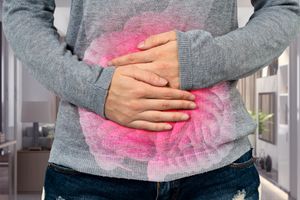Are you looking for a way to keep your baby healthy and strong?
A great way to do that is by giving your baby probiotics. Probiotics are good bacteria that help support the immune system and digestion. And there are lots of great products on the market today that can help you do just that.
In this article, we will discuss the best baby probiotics on the market and what makes them stand out from the competition. We'll also provide a buyer's guide to help you choose the right product for your baby!
Read our article to learn more about the best baby probiotics on the market!
How We Choose the Best Baby Probiotics
You want to give your baby the best start in life, but you're not sure what probiotic supplements are the best for them.
All of the different options and claims can be overwhelming. And it's not just about finding a probiotic that has the right bacteria strains- you also need to make sure those strains will last long enough to make a difference, that the ingredients are safe, and that the dosage is effective.
We've done all of the hard work for you and found the best baby probiotics on the market for your baby's gut health.
Our list includes only products with research-backed bacterial strains, high-quality manufacturing standards, and dosages that have been shown to be effective.
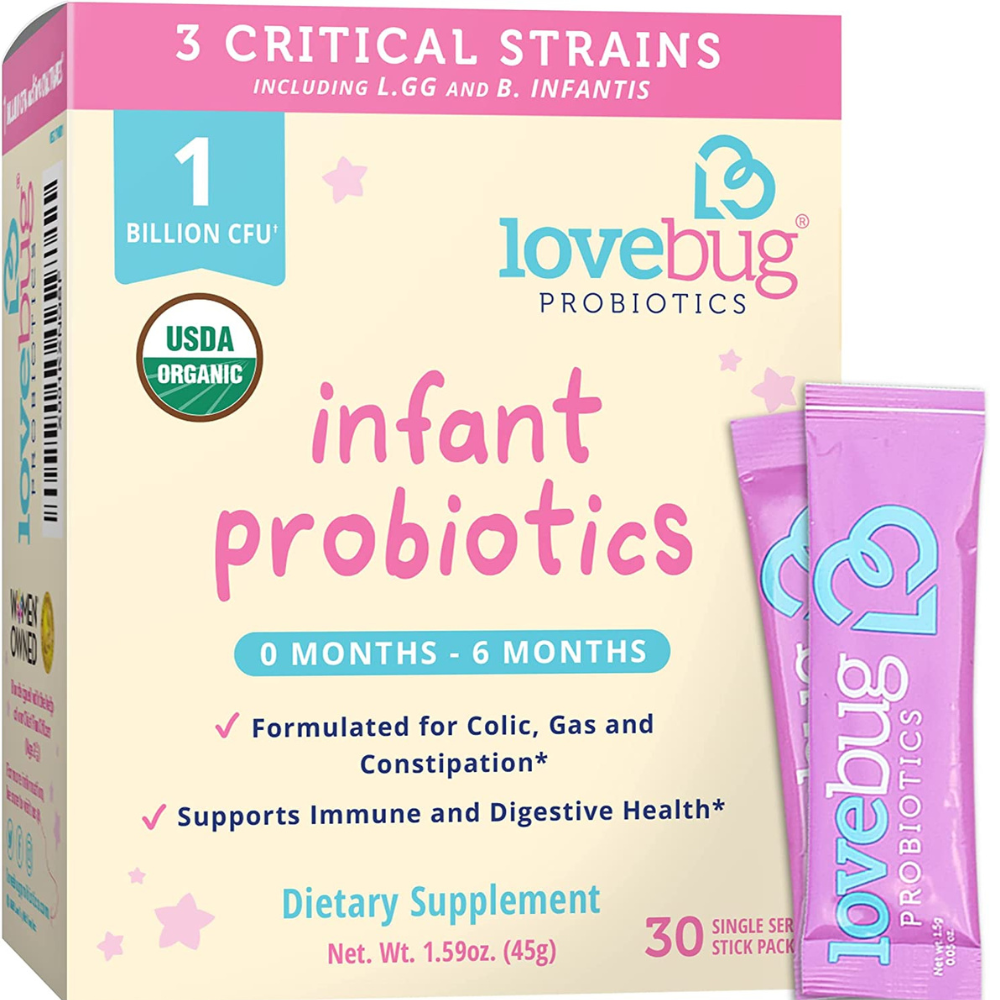
Best Powder
Lovebug Infant Probiotics
Why It’s Great
If you're looking for a probiotic powder that can help with your infant's digestive health, Lovebug is an excellent choice.
This particular probiotic contains three of the most effective probiotic strains of bacteria that have been studied for their ability to support your baby's gut microbiome and immunity. These probiotic strains are Lactobacillus rhamnosus GG, Bifidobacterium Infantis, and Bifidobacterium lactis.
The powder is tasteless, making it easy to add to your infant's food or bottle without them even knowing it's there. Plus, it's easy to store and transport, so you can take it with you wherever you go.
Things To Know
Lovebug Infant Probiotic is a great choice for parents who want to give their baby the best possible start in life. This probiotic is Non-GMO, sugar-free, vegan and allergen-free.
It is also in pre-portioned packs, so you know exactly how much your baby is getting. Each serving contains 15 billion CFU, which is the recommended amount for a baby's needs.
They also have a version with vitamin D.
Plus, this probiotic comes with a 100% money-back guarantee, so you can be sure you're making a wise investment in your baby's health.
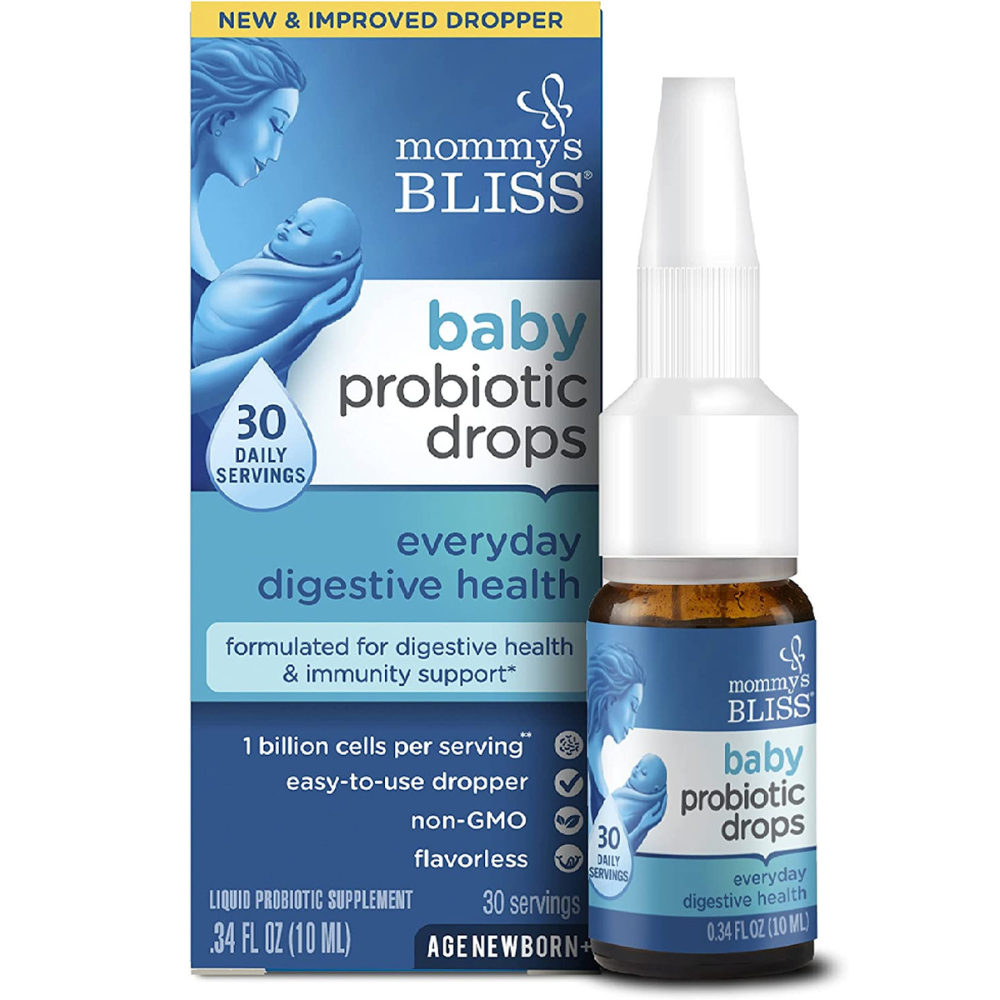
Best Drops
Mommy's Bliss Baby Probiotic Drops
Why It’s Great
Mommy's Bliss Probiotic Drops are great! Their powerful liquid probiotics formula helps promote digestive health and Immune system support for your little one.
Each drop contains the clinically studied probiotic strain Lactobacillus rhamnosus GG strain, which has been shown to be effective in supporting a healthy gut microbiome.
Their unique microencapsulation technology protects the probiotics from stomach acid, allowing them to reach the gut intact and ready to work their magic! Just add a few drops to breastmilk, formula, or water, and you're all set!
There are so many benefits of probiotics for babies and toddlers, including reducing the risk of food allergies, promoting healthy digestion, and boosting immunity. Probiotics are an important part of a healthy diet for both adults and children, so it's great to see a product like this that is specifically designed for babies.
Things To Know
Mommy's Bliss Probiotic Drops are safe for infants from birth to 12 months old. They are non-GMO, soy-free, dairy-free, and sugar-free. Plus, they are easy to use- just add a few drops of the liquid probiotic to your baby's food or drink, and you're all set! Each bottle contains 30 servings, so it's a great value for the price.
Things to consider
These drops contain corn oil.
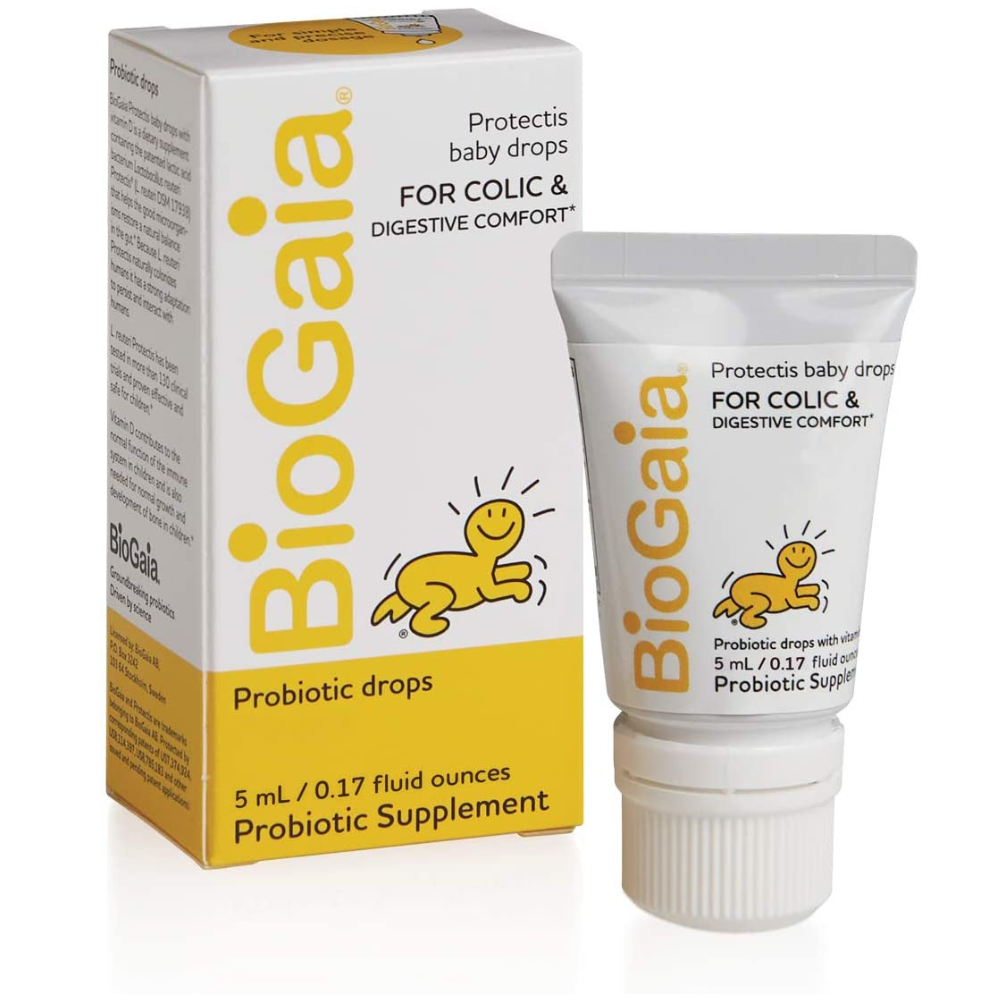
Best for Colic
BiaGaia Protectis Probiotic Drops
Why It’s Great
If you're a parent, there's nothing more heartbreaking than hearing your little one cry in pain and not being able to do anything about it. BioGaia Protectis Probiotic Drops can help. Containing the live strain Lactobacillus reuteri Protectis, research has shown that this probiotic can reduce crying and fussing in colicky babies.
Just a few drops of this product can make a world of difference for both you and your baby. And because BioGaia is committed to providing the best possible products, they also offer a version with added vitamin D to ensure that your baby gets all the nutrients they need. Don't let colic ruin your parenting experience - give BioGaia Protectis Probiotic Drops
Things To Know
Parents always want what's best for their babies, and that includes finding the right probiotic. BioGaia baby probiotics contain 100 billion live bacteria per dose, making them one of the most potent formulas on the market. The recommended dosage is 5 drops, which can be added to breast milk, formula, or water.
With such a high concentration of live bacteria, BioGaia probiotics are an excellent way to promote a healthy gut flora in your little one. And because they're easy to administer and relatively inexpensive, they're a great option for parents who are looking for a quality probiotic for their baby.
Things to consider
BioGaia probiotics do not contain a dropper. This means that there is no risk of contamination, and parents can be confident that their babies are getting the full dose of probiotics. Plus, BioGaia baby probiotics are easy to take, and they do not have any artificial flavors or colors.
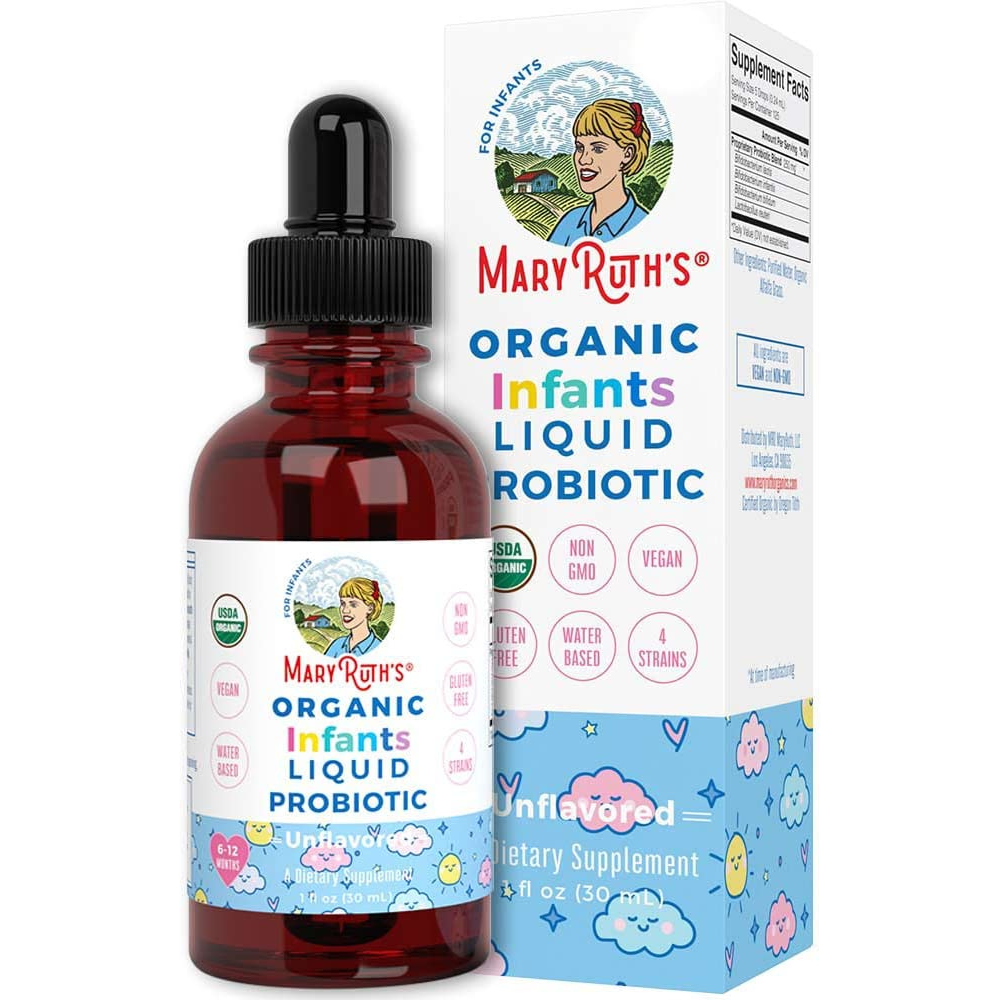
Best for Overall Gut Health
Mary Ruth's Infant Probiotics
Why It’s Great
If you're looking for liquid probiotics that are specifically designed for infants, look no further than Mary Ruth's Infant Probiotics. This formula contains 12 healthy bacteria strains, including Lactobacillus species and Bifidobacterium species including bifidobacterium lactis, bifidobacterium infantis, bifidobacterium bifidum, and lactobacillus reuteri, which research has shown to be beneficial for gut health and the immune system.
Plus, it's easy to give to your little one - just mix it with their food or drink once a day. Trust us, both you and your baby will love Mary Ruth's Infant Probiotics!
Things To Know
Mary Ruth's baby probiotic is the perfect way to give your little one a boost of healthy bacteria. Made in a GMP facility, it is USDA organic, non-GMO, dairy-free, nut-free, gluten-free, soy-free, and sugar-free.
The 2 oz bottle contains up to 20 servings. Plus, the easy-to-use dropper makes it easy to give your baby the exact amount they need. Simply add the desired amount of probiotic to breast milk or formula and give it to your baby at mealtimes.
With regular use, Mary Ruth's baby probiotic will help to promote a healthy digestive system and a strong immune system. Give your baby the best start in life with Mary Ruth's baby probiotic!
Baby Probiotic FAQs
Parents are always looking for ways to improve their baby's health, but there is a lot of conflicting information out there.
It can be hard to know what is best for your baby, especially when it comes to probiotics. Do you give them yogurt? Should you buy a probiotic supplement? What about prebiotics?
We've got the answers to all your questions about baby probiotics right here. Keep reading for everything you need to know about how and why probiotics are beneficial for babies.
Should I give probiotics to my baby?
Probiotics are good bacteria that line the gut and support digestive health. Strains of probiotics have been shown to be helpful for babies and toddlers, and they're especially important for babies, who need a healthy gut to support their developing immune systems.
There are many different types of probiotics, so it's important to choose one that's suited to your baby's individual needs.
For example, some probiotics are better at combating diarrhea, including antibiotic associated diarrhea, while others are better at boosting immunity. As always, it's best to consult with your pediatrician before giving your child any supplements.
When should babies take probiotics?
Probiotics are beneficial bacteria that line the gut and support digestion and nutrient absorption. They can be taken by adults and children of all ages, but they are especially important for babies.
The most important time to start probiotics is during the first two years of life when the baby's immune system is still developing.
Probiotics help to establish a healthy balance of gut flora, which can protect against allergies, eczema, and other autoimmune disorders.
You can give them probiotic supplements or add probiotic-rich foods to their diet such as yogurt and fermented foods.
Do probiotics for babies help with gas?
Yes, probiotics can help with gas. They work by helping to balance the good and bad bacteria in your baby's gut. This can help to reduce episodes of gas, bloating, and diarrhea.
Probiotics are also thought to have many other benefits, including boosting the immune system and reducing the risk of allergies. If you're interested in giving your baby probiotics, talk to their doctor first to see if it's right for them.
Do probiotics make babies poop more?
There's no one-size-fits-all answer to this question, as the effect of probiotics on baby poop varies depending on the baby and the specific probiotic used. However, many parents report that their babies do seem to poop more when they're taking probiotics.
Probiotics are live microorganisms that can offer health benefits when taken in sufficient amounts. They're often called "good" or "friendly" live bacteria because they help keep the gut healthy by preventing bad bacteria from taking over.
Probiotics are found naturally in some foods like yogurt and sauerkraut, but they're also available in supplement form.
While there's no definitive answer as to whether or not probiotics make babies poop more, many parents find that they do seem to have this effect. If you're interested in giving your baby probiotics, talk to their doctor first to see if it's right for them.
Can probiotics make baby worse?
It's possible that probiotics could make a baby worse if the baby is allergic to them or if they are given in too high of doses. However, probiotics are generally considered safe for babies and toddlers.
It's important to consult with a doctor before giving a probiotics to your baby, as each child is different and will respond differently to probiotics. Probiotics should not be given to newborns without consulting with a healthcare professional.
Can you add probiotics to baby formula?
Yes, probiotics can be added to baby formula. Probiotics are live microorganisms that can offer benefits. They're often called "good" or "friendly" bacteria because they help compete with harmful bacteria in the digestive system.
Adding probiotics to baby formula may help promote a healthy digestive system and strengthen the immune system. Probiotics are available in powder, capsule, and liquid forms.
If probiotics are added to the formula make sure the formula is not heated to much or the heating may kill the probiotic strains. Heating to a lukewarm temperature or around body temperature should be safe for the probiotic strains.
Talk to your child's health care provider if you're interested in adding probiotics to baby formula.
Do probiotics help with colic?
There is some evidence that probiotics may help colicky babies. A study published in the journal Pediatrics found that a probiotic formula containing Lactobacillus reuteri helped reduce crying time in infants with colic.
Another study, published in the journal JAMA Pediatrics, found that a probiotic mixture containing Lactobacillus rhamnosus and Bifidobacterium infantis helped reduce crying and fussing time in infants with colic.
Probiotics are live good bacteria and yeast that are good for your health, and they have been shown to have a variety of health benefits. Some research suggests that taking probiotics may help improve gut health and boost immunity.
In addition, probiotics have been shown to reduce the risk of allergies and eczema. If you're interested in giving your baby probiotics, talk to their doctor first to see if it's right for them.
Can a baby have too many probiotics?
It's possible for a baby to have too many probiotics if they're taking a high-dose supplement, but it's more likely that they're not getting enough if they're experiencing problems like diarrhea, constipation, or thrush.
Probiotics are essential for keeping the gut healthy and helping with digestion, so it's important to make sure your baby is getting enough of them. Talk to your pediatrician if you're concerned about your baby's probiotic intake.
Do breastfed babies need probiotics?
Yes, breastfed babies need probiotics! Probiotics help to establish and maintain a healthy gut flora, which is important for many aspects of health.
Breast milk itself contains beneficial bacteria that can help to colonize a baby's gut, but supplemental probiotics can be helpful as well. Probiotics may also help to ease symptoms of diarrhea and other digestive issues. Talk to your pediatrician about whether giving your breastfed baby probiotics is right for you.
When is the best time to give probiotics to a baby?
The best time to give probiotics is right after birth. Why? Because that's when they're most vulnerable to outside influences, such as what's in the hospital environment or parasites they may have picked up from their mother during birth.
Giving newborns probiotics early on will help establish good gut health.
Best baby probiotic for you
Now that you know all about the best baby probiotics, it’s time to pick up one and get your little one started on the road to good health.
Remember, these beneficial bacteria should be introduced as early as possible to help establish healthy gut bacteria.
And don’t forget – always consult with your pediatrician before starting any new supplement regimen. Thanks for reading, and we hope you find the perfect probiotic for your little one today!




